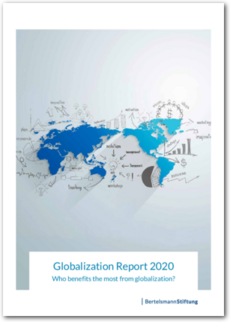Protectionism is the wrong answer to Corona - Globalization increases prosperity
Bertelsmann Stiftung (Hrsg.)
Dr. Andreas Sachs, Dr. Claudia Funke, Philipp Kreuzer, Johann Weiss
Globalization Report 2020
- Ausgabeart
- Erscheinungstermin
- 08.09.2020
- Auflage
- 1. Auflage 2020
- Umfang/Format
- 88 Seiten, PDF
Format
-
PDF
Preis
kostenlos
Beschreibung
The coronavirus crisis is leaving deep marks on the international flows of goods and value chains. Reducing globalization is problematic since free trade and the global division of labor have increased prosperity in many countries for nearly three decades now, according to calculations conducted by Prognos AG for the new edition of the Bertelsmann Stiftung’s Globalization Report. This report measures the degree of international integration of 45 industrialized and emerging countries, as well as the resulting direct welfare gains. All of the analyzed countries recorded increases in real gross domestic product (GDP) per capita that can be attributed to globalization between 1990 and 2018.
In a country comparison, it stands out that both developed and emerging economies can claim to be winners of globalization. In absolute terms, developed nations have reaped the biggest gains. At around 1,790 euros, the largest average income gains per capita and year in the period from 1990 to 2018 were recorded in Japan. The subsequent ranks are held by Ireland (around 1,610 euros), Switzerland (around 1,580 euros), Finland (around 1,340 euros), and Israel (around 1,280 euros). In relative terms, emerging econmies and young market economies have recorded the the biggest gains: Globalization-induced income gains recorded between 1990 and 2018 amount to 618 percent of real gross domestic product per person in 1990. South Korea (373 percent), Poland (366 percent), Hungary (352 percent) and Chile (339 percent) make up the remainder of the TOP5.
The lack of robust data as a basis for calculation of the globalization gains for the years of 2019 and 2020 makes it difficult to estimate the impact of the global economic collapse from the coronavirus pandemic. To establish a point of reference nevertheless, Prognos AG has used OECD forecasts for future economic development for Germany, along with a reduction of the value from the Globalization Index of 2018, as a basis since the pandemic interferes with supply chains and massively harms tourism. Based on the direct gains from globalization in 2018, the losses from a reduction of globalization would amount to 100 to 500 euros per citizen in Germany this year. In the most severe scenario, this may correspond to one third of the globalization gains total of 1,400 euros.






